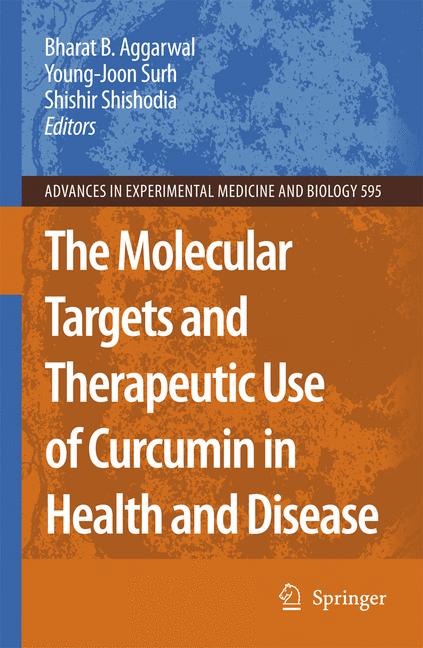| Chapter title |
Curcumin and autoimmune disease.
|
|---|---|
| Chapter number | 19 |
| Book title |
The Molecular Targets and Therapeutic Uses of Curcumin in Health and Disease
|
| Published in |
Advances in experimental medicine and biology, June 2007
|
| DOI | 10.1007/978-0-387-46401-5_19 |
| Pubmed ID | |
| Book ISBNs |
978-0-387-46400-8, 978-0-387-46401-5
|
| Authors |
Bright JJ, John J. Bright, Bright, John J. |
| Editors |
Bharat B. Aggarwal Ph.D., Young-Joon Surh Ph.D., Shishir Shishodia Ph.D. |
| Abstract |
The immune system has evolved to protect the host from microbial infection; nevertheless, a breakdown in the immune system often results in infection, cancer, and autoimmune diseases. Multiple sclerosis, rheumatoid arthritis, type 1 diabetes, inflammatory bowel disease, myocarditis, thyroiditis, uveitis, systemic lupus erythromatosis, and myasthenia gravis are organ-specific autoimmune diseases that afflict more than 5% of the population worldwide. Although the etiology is not known and a cure is still wanting, the use of herbal and dietary supplements is on the rise in patients with autoimmune diseases, mainly because they are effective, inexpensive, and relatively safe. Curcumin is a polyphenolic compound isolated from the rhizome of the plant Curcuma longa that has traditionally been used for pain and wound-healing. Recent studies have shown that curcumin ameliorates multiple sclerosis, rheumatoid arthritis, psoriasis, and inflammatory bowel disease in human or animal models. Curcumin inhibits these autoimmune diseases by regulating inflammatory cytokines such as IL-1beta, IL-6, IL-12, TNF-alpha and IFN-gamma and associated JAK-STAT, AP-1, and NF-kappaB signaling pathways in immune cells. Although the beneficial effects of nutraceuticals are traditionally achieved through dietary consumption at low levels for long periods of time, the use of purified active compounds such as curcumin at higher doses for therapeutic purposes needs extreme caution. A precise understanding of effective dose, safe regiment, and mechanism of action is required for the use of curcumin in the treatment of human autoimmune diseases. |
X Demographics
Geographical breakdown
| Country | Count | As % |
|---|---|---|
| United States | 1 | 100% |
Demographic breakdown
| Type | Count | As % |
|---|---|---|
| Members of the public | 1 | 100% |
Mendeley readers
Geographical breakdown
| Country | Count | As % |
|---|---|---|
| Australia | 2 | 1% |
| United States | 2 | 1% |
| Indonesia | 1 | <1% |
| Spain | 1 | <1% |
| Unknown | 190 | 97% |
Demographic breakdown
| Readers by professional status | Count | As % |
|---|---|---|
| Student > Bachelor | 30 | 15% |
| Student > Ph. D. Student | 26 | 13% |
| Student > Master | 20 | 10% |
| Researcher | 18 | 9% |
| Student > Postgraduate | 16 | 8% |
| Other | 44 | 22% |
| Unknown | 42 | 21% |
| Readers by discipline | Count | As % |
|---|---|---|
| Medicine and Dentistry | 45 | 23% |
| Agricultural and Biological Sciences | 22 | 11% |
| Nursing and Health Professions | 21 | 11% |
| Biochemistry, Genetics and Molecular Biology | 13 | 7% |
| Pharmacology, Toxicology and Pharmaceutical Science | 8 | 4% |
| Other | 29 | 15% |
| Unknown | 58 | 30% |
